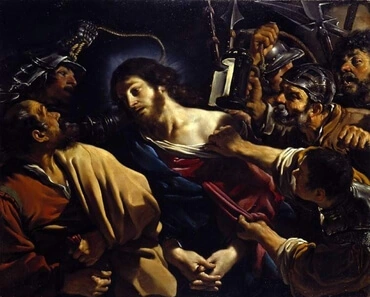Explanation of John 1:10
By Brian David

The beginning of John 1 illustrated how divine truth – which is the ultimate expression of the Lord’s love – is the actual creative force of the universe and of reality itself. That idea is reinforced here: "him" refers to Jesus, who was the physical embodiment of divine truth, which indeed made the world.
This verse offers another level, though. "World" represents the church, which is defined in the Writings as "where the Lord is known and where the Word is." By that definition a "church" can be as small as one person, or as large as billions of people worshiping through a wide variety of denominations. And the Writings tell us that the Lord has made sure that such a church always existed, from prehistoric times when the Lord offered "the Word" – His truth – to people directly up through today, when we have the Word in the form of the Bible.
But the world did not know him. At the time the Lord came among us as Jesus, people had turned away from the deeper meanings of the Word (which they then had in the form of the Old Testament), and had little to no concern for knowing the Lord. His church – the church among the Children of Israel – had turned away.
This might seem like a merely historic idea, something that happened then but has little to do with us now. But each one of us is a "church," and each one of us can know the Lord and the Word, or turn away. We all go through states when we are like the church at the time the Lord was born, and He can rebuild us now even as He rebuilt the church then. For that to happen, though, we need to turn to the Word – the Bible – and know the Lord.
(References: Apocalypse Explained 1093; Canons of the New Church 9; The Apocalypse Explained 294 [16])
Arcana Coelestia #3798
3798. That Jacob came near and rolled the stone from over the mouth of the well' means that the Lord, by virtue of natural good, disclosed the interior contents of the Word. This is clear from the representation of 'Jacob' as the Lord's Divine Natural, dealt with already, here as regards the good in it, and from the meaning of 'rolling the stone from over the mouth of the well' as disclosing the interior contents of the Word, dealt with in 3769, 3771, 3773, 3789. The reason why the highest sense here means that the Lord by virtue of natural good disclosed the interior contents of the Word is that 'Jacob' here represents good within the Natural. For Jacob takes on the representation of good because truth had now to be allied to it through the affection which 'Rachel' represents, see just above in 3775, 3793; and it is by virtue of good that the interior contents of the Word are disclosed, 3773.
[2] It is plainly evident that the Word is disclosed by virtue of good. Everyone looks from the love present in him at the things that belong to that love; and what he sees he calls truths because these are in harmony with it. Everyone's love holds the light of his life within it, for love is like a flame which radiates light. The nature of a person's love or flame therefore determines that of the light of truth with him. Those who are stirred by a love of good are able to see the things belonging to that love, and so to see the truths that are in the Word. They do so according to the amount and the quality of their love of good, for light or intelligence flows in from heaven, that is, from the Lord by way of heaven. This is why, as already stated, no one is able to see and acknowledge the interior contents of the Word except one whose life is governed by good.






